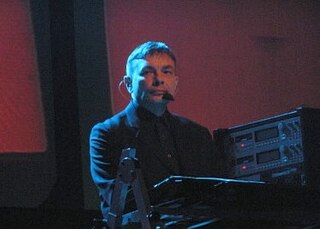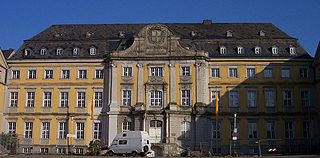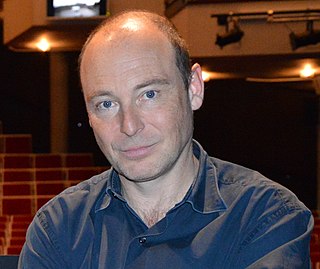
Ralph Christian Möbius, known professionally as Rio Reiser, was a German musician and from 1970 to 1985 the lead singer and main lyric-writer for the rock group Ton Steine Scherben. After that band broke up, he worked as a solo artist. Among his best known songs are Macht kaputt, was euch kaputt macht, Keine Macht für Niemand, and the Rauch-Haus-Song with the Ton Steine Scherben. As a solo artist, his best known songs are König von Deutschland, Alles Lüge, and Junimond. Reiser supported squatting in the early 1970s and later the green political party Die Grünen. After the German reunification, he joined the Party of Democratic Socialism.

Ton Steine Scherben was one of the first and most influential German language rock bands of the 1970s and early 1980s. Well known for the highly political and emotional lyrics of vocalist Rio Reiser, they became a musical mouthpiece of new left movements, such as the squatting movement, during that time in Germany and their hometown of West Berlin in particular. Today, after the band's demise in 1985, and the death of Rio Reiser in 1996, Ton Steine Scherben have retained a cult following and popularity in the related scenes. Recently, some of the remaining members have given reunion concerts.

Maximilian Lenz, known by his stage name WestBam, is a German DJ and musician. He is the co-founder of the record label Low Spirit.

Karl Bartos is a German musician and composer known for his contributions to the electronic band Kraftwerk.

The Folkwang University of the Arts is a university for music, theater, dance, design, and academic studies, located in four German cities of North Rhine-Westphalia. Since 1927, its traditional main location has been in the former Werden Abbey in Essen in the Ruhr area, with additional facilities in Duisburg, Bochum, and Dortmund, and, since 2010, at the Zeche Zollverein, a World Heritage Site also in Essen. The Folkwang University is home to the international dance company Folkwang Tanz Studio (FTS). Founded as Folkwangschule, its name was Folkwang Hochschule from 1963 until 2009.

David B. Moody is an artist, producer, songwriter and filmmaker from North Carolina. His instrumental proficiency has earned him two Grammy Award Nominations and three International CMA Awards as a member of The Moody Brothers. After becoming regular performers on the Grand Ole Opry and touring extensively throughout Europe in the 80s, the trio of Carolina brothers signed a contract with the Walt Disney Company in 1992 to open and perform their own nightly concerts at Disneyland Paris' Disney Village, where they performed for over 50 million guests during their time in France.

“Guten Tag” is a 2002 song by German band Wir sind Helden. It was first released on an EP of the same title in 2002 and one year later as the first single of their debut album Die Reklamation. It was composed by Jean-Michel Tourette, Judith Holofernes and Pola Roy while the lyrics were written by Holofernes. The title is German for good day.

Thomas Truax is an American songwriter, performer, animator, and inventor of experimental musical instruments.

Tele is a German rock/pop band from Freiburg.

Warum geht es mir so dreckig? is the first album released by the German rock band Ton Steine Scherben. It includes—among other pieces—the song Macht kaputt, was euch kaputt macht, which expressed the built-up anger and radicalization of the youth of the late 1960s and early 1970s.

Keine Macht für Niemand is the name of both the second album and best-known song by the German rock band Ton Steine Scherben. The double album, released in 1972, is also sometimes called “die Weiße” in reference to its simple cover with a white background and black text.

Wenn die Nacht am tiefsten… is the third album released by Ton Steine Scherben, and is the last one released before their six-year break from recording. It shows the first signs of a change in genre: moving away from Macht kaputt, was euch kaputt macht towards Halt dich an deiner Liebe fest.

Straftanz was a German electronic dance music project, established in the summer of 2006. Straftanz consisted of a loose group of artists who called themselves the Straftanz ZK. Additional artists involved were Carsten Jacek (SITD), Mille Petrozza, and Myk Jung who were involved in the recording of the first album Forward Ever. Straftanz also collaborated with the futurepop project Rotersand by way of sharing ideas and equipment. In interviews, Straftanz described its musical style as "Industrial-Streetfighting-Dance". In fact, the sound of Straftanz is best described as a mixture of EBM, futurepop, trance, rave, metal, and rhythm noise elements that are tied together with a present dance groove.
David Arch, better known as Dave Arch, is a British pianist, conductor, arranger and composer with a career covering albums, films and commercials, television and live performances. Since 2006, he is Musical Director and arranger for BBC Television's Strictly Come Dancing.

Theater Dortmund is a theatrical organization that produces operas, musicals, ballets, plays, and concerts in Dortmund, Germany. It was founded as the Stadttheater Dortmund in 1904. Supported by the German Government, the organization owns and operates several performance spaces.

Destroyer is a Canadian indie rock band from Vancouver, formed in 1995. The band is fronted by founding member Dan Bejar, with a collective of regular band members and collaborators joining him in the studio and during live performances. Alongside Bejar, Destroyer currently includes longtime producers John Collins (bass) and David Carswell (guitar), Nicolas Bragg, Ted Bois (keyboards), JP Carter (trumpet) and Joshua Wells (drums).

Jens-Daniel Herzog is a German stage director for play and opera, and a theater manager.

Maybebop is a German male a cappella quartet consisting of founding member Oliver Gies, Jan Malte Bürger, Lukas Teske and Christoph Hiller. The group sings predominantly German-language self-compositions, although it has released cover versions of rock hits such as "Nothing Else Matters", "Smells Like Teen Spirit" and "Bohemian Rhapsody". In addition, the group has released jazz adaptations of folk and Christmas songs like "Abendlied", "Die Gedanken sind frei" and "Still, still, still".

Simon Stockhausen is a German composer. His parents are the artist Mary Bauermeister and the composer Karlheinz Stockhausen; the musician Markus Stockhausen is his half-brother.
"Macht kaputt, was euch kaputt macht" is a 1970 song by German proto-punk band Ton Steine Scherben and a subsequent political slogan. Written in 1969, it first appeared as a single the next year, followed by the band's 1971 debut album Warum geht es mir so dreckig? The slogan was subsequently used in the German autonomous, squatting, and contemporary anarchist outgrowths of the 1960s West German student movement.





















